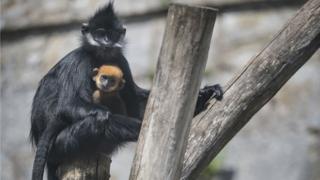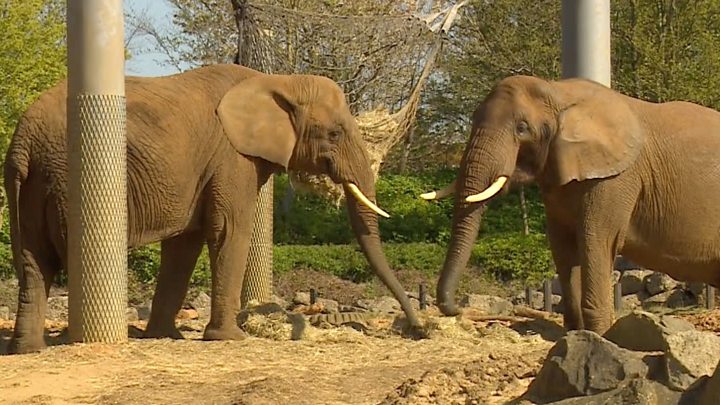 Image copyright Getty Images
Image copyright Getty Images A number of zoos around the world are reporting that their animals are becoming “lonely” without visitors.
Zoos have had to close to members of the public due to Covid-19.
At Phoenix Zoo, keepers have lunch dates with elephants and orangutans, and one sociable bird needs frequent visits. Primates have gone looking for missing visitors.
Dublin Zoo said animals were also “wondering what’s happened to everyone”.
Director Leo Oosterweghel said the animals look at him in surprise.
“They come up and have a good look. They are used to visitors,” he told the Irish Times.
At Orana Wildlife Park in New Zealand, rhinos and giraffes were turning up for their scheduled “meet the public” appearances.
“The kea and gorillas particularly seem to be missing people, they really enjoy seeing the public,” spokesman Nathan Hawke told the Guardian.
Phoenix Zoo reported a change in behaviour in their animals.
Linda Hardwick, communications director told the BBC: “We have noticed that some of our more “social” animals are not a fan of the stay at home and social distancing orders. Primates especially have noticed our guests are gone and go looking for them.”

Media playback is unsupported on your device
Without visitors, some animals lack stimulation, Paul Rose, lecturer in animal behaviour at the University of Exeter, told the BBC.
“Some individuals, such as primates and parrots get a lot of enrichment from viewing and engaging with visitors. It is beneficial to the animal’s wellbeing and quality of life. If this stimulation is not there, then the animals are lacking the enrichment,” he said.
To ensure animals are kept occupied, he said animals should be let out into their enclosures as normal.
At Phoenix Zoo, keepers are trying to spend as much time as possible with the animals, Ms Hardwick said.
“Our Tropical Flights Aviary is home to a very special, and social bird; Dynah the Bali myna, who is missing the attention of guests. Bird keepers are visiting her frequently to curb her loneliness,” she added.
At the Wildfowl & Wetlands Trust at Slimbridge in the UK, staff are continuing to engage with the ducks and geese in the same manner as the public would.
The team hand feed grain to birds and walk around the enclosures to ensure the animals are used to having people around.
Meanwhile, some animals are “forgetting about humans” due to the lack of visitors.
An aquarium in Japan has asked people to FaceTime its eels so that they remain comfortable around people.
The animals were said to hide whenever they saw a member of staff approach their enclosure.
With social distancing in place, it’s unclear when zoos and wildlife centres will reopen. In Germany, zoos have already reopened to the public but for some countries it could be a lot longer.
So should there be any concern about the animals being surprised by people when they do open?
“I think many zoo animals are quite resilient and will be aware of changes in daily rhythms,” says Paul Rose. “But phased opening of animal houses would be a good thing to do, to ensure that sudden noise change from quiet to loud is not unduly affecting the inhabitants.
“The continued presence of zoo staff will mean that people are not suddenly going to be unfamiliar.”
Click Here to Visit Orignal Source of Article https://www.bbc.co.uk/news/world-52493750


